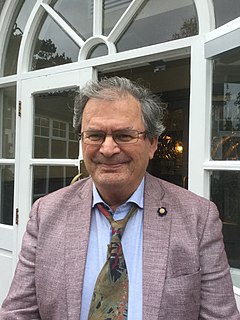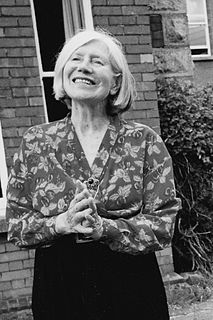
Sorley MacLean was a Scottish Gaelic poet, described by the Scottish Poetry Library as "one of the major Scottish poets of the modern era" because of his "mastery of his chosen medium and his engagement with the European poetic tradition and European politics". Nobel Prize Laureate Seamus Heaney credited MacLean with saving Scottish Gaelic poetry.
Although Irish has been used as a literary language for more than 1,500 years, and modern literature in Irish dates – as in most European languages – to the 16th century, modern Irish literature owes much of its popularity to the 19th century Gaelic Revival cultural movement. Writers in Irish have since produced some of the most interesting literature to come out of Ireland, supplemented by work produced in the language abroad.

Michael Hartnett was an Irish poet who wrote in both English and Irish. He was one of the most significant voices in late 20th-century Irish writing and has been called "Munster's de facto poet laureate".
Máirtín Ó Direáin was an Irish poet from the Aran Islands Gaeltacht. Along with Seán Ó Ríordáin and Máire Mhac an tSaoi, Ó Direáin was, in the words of Louis de Paor, "one of a trinity of poets who revolutionised Irish language poetry in the 1940s and 50s."

Gabriel Rosenstock is an Irish writer who works chiefly in the Irish language. A member of Aosdána, he is poet, playwright, haikuist, tankaist, essayist, and author/translator of over 180 books, mostly in Irish. Born in Kilfinane, County Limerick, he currently resides in Dublin.
Angus Peter Campbell is a Scottish award-winning poet, novelist, journalist, broadcaster and actor.
Derick Smith Thomson was a Scottish poet, publisher, lexicographer, academic and writer. He was originally from Lewis, but spent much of his life in Glasgow, where he was Professor of Celtic at the University of Glasgow from 1963 to 1991. He is best known for setting up the publishing house Gairm, along with its magazine, which was the longest-running periodical ever to be written entirely in Gaelic, running for over fifty years under his editorship. Gairm has since ceased, and was replaced by Gath and then STEALL. He was an Honorary President of the Scottish Poetry Library, and a Fellow of the Royal Society of Edinburgh and the British Academy. In June 2007, he received an honorary degree from Glasgow University.

Aonghas MacNeacail, nickname Aonghas dubh or Black Angus) is a contemporary writer in the Scottish Gaelic language.
Dr Tomás Mac Síomóin was an Irish doctoral graduate of Cornell University, New York, who worked as a biological researcher and university lecturer in the US and Ireland. He worked as a journalist, as editor of the newspaper Anois and for many years was editor of the literary and current affairs magazine, Comhar. He wrote in Irish and published both poetry and fiction in that language.
Theo Dorgan is an Irish poet, writer and lecturer, translator, librettist and documentary screenwriter. He lives in Dublin.

Christopher Whyte is a Scottish poet, novelist, translator and critic. He is a novelist in English, a poet in Scottish Gaelic, the translator into English of Marina Tsvetaeva, Pier Paolo Pasolini and Rainer Maria Rilke, and an innovative and controversial critic of Scottish and international literature. His work in Gaelic appears under the name Crìsdean MacIlleBhàin.
Seán Ó Tuama was an Irish poet, playwright and academic.
Scottish Gaelic literature refers to literature composed in the Scottish Gaelic language, a member of the Goidelic branch of Celtic languages, along with Irish and Manx.

Cathal Ó Searcaigh, is a modern Irish language poet. His work has been widely translated, anthologised and studied. "His confident internationalism", according to Theo Dorgan, has channelled "new modes, new possibilities, into the writing of Irish language poetry in our time".
Doireann Ní Ghríofa is an Irish poet and essayist who writes in both Irish and English.
Pádraig Mac Fhearghusa is an Irish language poet, magazine editor and language activist.
Kevin Kiely is a poet, critic, author and playwright whose writings and public statements have met with controversy and also with support.

Eithne Strong was a bilingual Irish poet and writer who wrote in both Irish and English. Her first poems in Irish were published in Combhar and An Glor 1943-44 under the name Eithne Ni Chonaill. She was a founder member of the Runa Press whose early Chapbooks featured artwork by among others Jack B. Yeats, Sean Keating, Sean O'Sullivan, Harry Kernoff among others. The press was noted for the publication in 1943 of Marrowbone Lane by Robert Collis which depicts the fierce fighting that took place during the Easter Rising of 1916.

Dàin do Eimhir is a sequence of sixty poems written in Scottish Gaelic by Sorley MacLean. Considered MacLean's masterpiece, the poems deal with intertwining themes of romantic love, landscape, history, and the Spanish Civil War, and are among the most important works ever written in Gaelic.
Paddy Bushe is an Irish poet.








